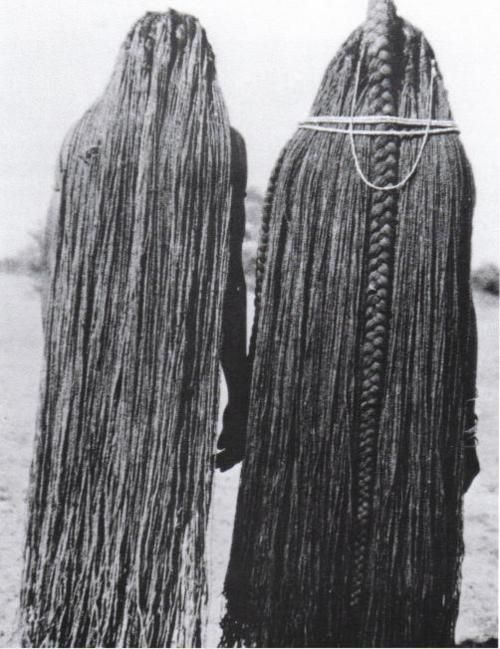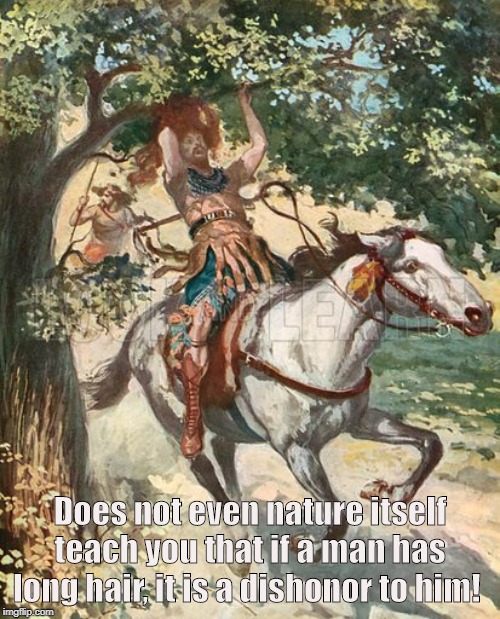
Let me start by saying that I couldn’t care less how men and women wear their hair in contemporary society. And I don’t think God cares either, so long as the heart is in the right place (honouring God, loving others). As Paul reminds us in 1 Corinthians 10,
Everything is permissible”, but not everything is beneficial. “Everything is permissible,” but not everything is edifying. No one should seek his own good, but the good of others.
Setting that important point aside, let’s talk about HAIR in the Bible! Hair is a considerable thread in the story of redemptive history and has garnered much controversy among Christians. What does Paul mean when he talks about men and women and hair, for example?
In my view, the Nazirites (see Numbers 6) hold the key to unlocking the symbolic significance of hair in the Bible. Of course, you may remember that the Nazirite vow involved not only hair but also grapes and death (three of my fav Biblical subjects). I’ll try to restrict myself to a few thoughts about hair for now, but this line of inquiry involves exciting stuff, so I’ll come back to more of it in a future post (especially the grapes).
When we look closer at each detail of the Nazirite vow, we begin to glimpse a piece of the puzzle of God’s great mystery in Christ. A crucial point to remember about the Nazirites is this: Both men and women took the Nazirite vow, laying the foundation for equality in Christ.
The vow involved:
1. No eating grapes, including anything made with grapes (including vinegar or wine), not even the skin or seeds of grapes.
2. No razor can touch a Nazirite’s hair during the period of the vow. ‘Their separation to God is on their head’ (Num. 6:7).
3. Don’t go near dead bodies.
When the vow was over, the Nazirite made an offering of a lamb and a ram, a grain offering (bread made with olive oil) and a drink offering. Then she or he shaved their head and burned their hair.
Like I said, all of these details are deeply symbolic. For now, what’s the deal with the hair? At this time in Israel’s history and even beyond, hair was a symbol of health (or lack of it), of vigour and life. But Nazirite hair was special.
Whereas non-Nazirite women also grew their hair long, male Nazirite behaviour around hair was markedly different from what we find elsewhere in the Bible, even among Levite men (see Ezekiel 44:20). The accounts of Esau (Gen. 25) and Nebuchadenezzar (Daniel 4:33) demonstrate that excessive hair growth for a man was seen as barbaric. In the story of David’s son Absalom in 2 Samuel, we see that love of hair for men can even cause death! Why is that?
Nazirites grew their hair as a symbol of life and of glory and burned their hair ritually, in an act which is the closest that Israel came to human sacrifice. Put simply, the Nazirite vow was a powerful foretelling of the sacrifice of Christ Himself. Long hair was worn by Nazirites as a sign for all of Israel of glory, an eschatological marker of what was to come, the death of Jesus Christ. This meant that in the OT, A non-Nazirite man growing his hair long was shameful because he was claiming what was not yet his. For a non-Nazirite woman, long hair was not a problem because woman herself already symbolizes union with Christ as God’s people, the bride of Christ.
In the NT, we see our (male and female) response to Christ’s sacrifice in the Nazirite-like command to offer ourselves as a living sacrifice (Rom 12:1).
But beyond this, we see Paul’s reminder to us of the significance of hair, even now, as an eschatological (things yet to come) marker, on the head of women, a sign of our reunion and life with Christ when He comes again. Of course, I’m not arguing for a legalistic line on this point nor is Paul! Regarding hair, we have moved beyond letter of the law to spirit of the law, regarding not the length of one’s hair but *one* of its underlying meanings: the significance of women and their visible and active presence in the people of God. I’ll come back to that another time.
For now, enjoy this meme that I generated that adds a layer of meaning to Paul’s comment about hair in 1 Corinthians 11. Good grief, people. Don’t you remember that nature killed that guy who had long hair?


A lot to think about here. Good stuff. I am looking forward to your follow-up posts!
LikeLiked by 1 person
Thanks, Sam. I love puzzling over the Nazirites
LikeLiked by 1 person
I’ve always puzzled over Matthew’s account of Jesus being from Nazareth, when he said “thus it was fulfilled that which was spoken by the prophets, ‘he shall be called a Nazarene’
But I think your insights are beginning to open up that door for me.
Thinking on it….
LikeLiked by 1 person
Sam, you might be interested in my latest post on the Nazirites. I’m sure there are more connections to be made, more loose ends to tie up. I will carry on working on the Nazirites for a long time, I think. Incredibly rich account.
LikeLike
Thank you! I will check it out. I got a little bit behind…
LikeLike
This is great, Valerie. Mark Garcia in his Theological Anthropology 6.3 and 6.4 uses Bransen Parlor’s work to talk about prevailing Stoic understandings of gender tied to hair length in the first century (https://www.bransonparler.com/blog/hair-length-and-human-sexuality-1-corinthians-1114), but you have gone beyond Bransen to make a convincing biblical-theological connection in line with Mark’s work on the Levitical woman in Leviticus15. Thanks so much for elucidating this. I am really excited about your blog.
LikeLiked by 1 person
Thanks, Anna! I’m looking forward to talking with you more
LikeLike